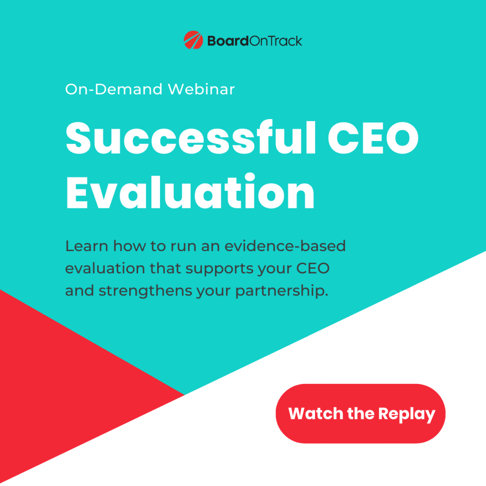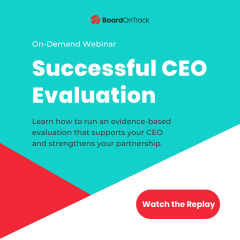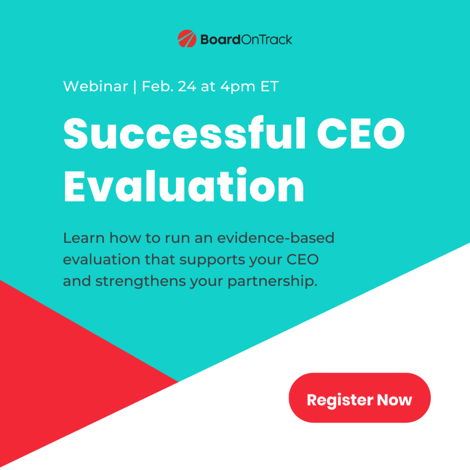An effective charter school organization hinges on a strong partnership between the board and its CEO. Yet, most charter school leaders have very little governance experience.
But whether you’re leading an early-stage school or running 20 campuses, working with your board is a skill that you can build. It doesn’t take an inordinate amount of time to become what we call a BoardSavvy™ CEO. And it’s less complex than closing the achievement gap.
While charter schools come in all shapes and sizes, each charter school is a multimillion-dollar public enterprise. For consistency, and to give this role the gravitas that it deserves, we call the person at the very top of the organization chart the CEO. This is the person who reports directly to your board.
In this article, we’ll walk you through the key practices of a BoardSavvy charter school CEO:
-> Communicate clearly and effectively
-> Maintain succession planning
And, as always, we’ll end with additional resources for you to continue to build up your knowledge and take the right actions to get results.
Build Strong Governance Knowledge
A BoardSavvy CEO:
- Has a strong understanding of effective governance best practices
- Annually completes professional development on governance
- Reads extensively about board governance issues
- [Extra Credit] Serves on another board outside of his or her organization
Charter school governance is a discipline you can learn. There’s a body of knowledge and proven best practices about public charter governance. There’s a path to excellence to follow.
In addition to the minimum, we highly recommend serving on another board outside of your organization.
The idea of serving on another board can seem overwhelming.
It’s not necessarily realistic for the pre-doors open or early-stage CEO, but something to consider as your organization evolves and your board is less reliant on you. It’s something to strive for.
And it’s worth it. Serving on another charter school’s board will give you a new perspective. It’ll help you appreciate your own board’s strengths and challenges.
Prioritize Your Governance
A BoardSavvy CEO:
- Sees developing and maintaining the board as one of their primary responsibilities
- Devotes significant time in helping the board run effectively
- Ensures that each board committee is appropriately staffed, either by the CEO or another senior staff member
- Includes governance training as a key component of professional development for senior staff
When you dreamed of forming a charter school, you likely thought about the kids and the parents and the amazing curriculum and all kinds of interesting pedagogy delivery models.
Very few future CEOs woke up one day and said, “Yay, I’m going to get to work with the board.”
But it is a part of the CEO’s job. And it needs to be a priority. Significant amounts of your time will be devoted to helping the board run effectively.
You might already work 60- or 70-hour weeks. So the idea of adding working with your board to that might feel like too much to pile on.
But your board will only become a great board, the strategic partner you need, or less reliant on you, if you lead them to become what you need.
It’s up to you, at least initially, to ensure that every board committee is appropriately staffed — either by you or, as you grow, by another senior staffer.
So, include governance training as a key component of professional development for your senior staff. They’re a key part of your overall governance team.
Often, we see charter school CEOs get the board functioning really well, but suddenly start to experience old challenges again. This is almost always because you’ve stopped prioritizing governance, or you haven’t trained your staff to do so as well.
When you’re in growth mode, you’re finally able to build out your senior staff; you don’t have to go to all the committee meetings. {As CEO, you still have to go to all the board meetings.}
But, when you start delegating, you might forget that your CFO or your Development Director and Chief Academic Officer {CAO} may have zero governance experience, just as you did at the start. And they might’ve had no governance training yet, either.
So, you all start tripping over that governance-management line, inadvertently, because without governance training, your senior staff don’t fully understand their roles, the board’s role, or how to partner effectively.
Prioritizing governance includes making governance training part of the professional development for senior staff. And remember, as a BoardOnTrack member, you can provide that training by assigning your senior staff to review the BoardSavvy webinars, as well as the Resources in the platform.

Educate the Board
A BoardSavvy CEO:
- Systematically and continually educates the board about key elements of running an exceptional charter school or network of schools
- Educates the board about the key issues the charter authorizer uses to judge the organization’s performance
- Educates the board about the charter renewal process
- Educates the board about state and national measures of academic success
It’s common for a charter school CEO to lament that the board doesn’t understand the complexities of something central to their mission, like what it takes to close the achievement gap.
And it’s incredibly hard to govern a multimillion-dollar public enterprise without a strong understanding of its key drivers.
As the CEO, you are the expert. Your board can’t make the right decisions if you’re not educating them about the body of knowledge you’ve absorbed.
It’s on the CEO and their staff to help the board learn more about charter school governance, your particular charter school, and its place in the broader community.
You’ll also likely need to educate the board about the charter school renewal process. And about how the charter authorizer will measure the organization’s performance.
The hardest part might be educating the board about the state and national measures of academic success.
Your board needs to become experts on these things, alongside you, so they can look at the data and make good decisions with you.
It’s the CEO’s role to decide what key topics you want your board to get a better handle on. Give them resources to educate them. Some BoardOnTrack members watch one of our on-demand board training webinars before the end of every board meeting — or ask people to watch in preparation of the meeting — and then lead a 10-minute board education conversation focused on the assignment.
Set a Strategic Direction for the Organization
A BoardSavvy CEO:
- Has a clear strategic vision for the organization
- Assists the board in clarifying the most important things they can do to help achieve the strategic vision
Often, as well-meaning as the board is, they just don’t know where they can help.
Even if they’re fully invested in your vision, they’ll still need you to tell them how they can add value each year.
Sometimes, it can be hard for CEOs to see how their board can help. Think it through. Ask your peers for ideas. Or, if you’re a BoardOnTrack member, ask our team for help.
Communicate Clearly and Effectively With the Board
A BoardSavvy CEO:
- Communicates clearly and effectively with the board
- Always sends out clear, well-organized materials in advance of the board meeting
- Provides the board with annual metrics on which to measure their individual and organization-wide performance
If your board members don’t know what will be discussed and expected of them at the next meeting, don’t have the information they need in advance of the meeting, or don’t know where to find all of the right documents and resources, they will not be able to contribute to the fullest.
And if you want your board members to stay engaged and excited about the work they’re doing with you, they need to know how they’re doing — as well as how the organization is doing as a whole.
In addition to the standard school performance metrics, provide clear metrics that demonstrate how the board is adding value each year — and where they need to evolve.
Our OnTrack Score makes this simple. Many members just fire up the BoardOnTrack platform live in their board meetings to help guide a data-driven discussion about overall board performance.
Maintain Succession Planning
A BoardSavvy CEO:
- Partners with the board to develop an agreed-upon short-term and emergency succession plan for the CEO position, that is well documented and reviewed annually.
- Annually discusses a long-term succession management plan for the organization with the board.
You’re in this to build great schools. And to make sure that what you build is sustained in the long term.
Even the most dynamic, amazing founders, won’t be able to lead an organization forever.
Succession planning is vital to your organization’s future.
As Caprice Young shared on our governing for growth webinar:
“You really don’t know that a charter school is successful until after the founders have left…And the leaders who have neglected their board and then eventually get to a point where it’s time to leave, leave their charters in a real crisis.”
It’s the board that takes an organization through a leadership change.
And, as the charter school movement gets to the 25- and 30-year mark, people who founded their charters at the beginning of the movement are now ready to retire. “But they’re finding that the whole organization is dependent on them.”
A BoardSavvy CEO partners with the board to develop an agreed-upon short-term emergency succession plan for the CEO position, as well as a long-term succession plan.
The plan is well documented. And, annually, you review the plan should discuss your succession plan with the board.
Are you growing talent from within? If not, why? What are you learning from the national charter movement about how to grow your own leaders? There’s so much you can gain if you talk with your board about this topic.
Learn more about succession planning for charter school CEOs and boards.
BoardOnTrack is built to measure how BoardSavvy the CEO is
Seeing how BoardSavvy you are is as simple: just take the CEO Evaluation built into BoardOnTrack. In fact, you and your trustees can go in and complete it.
Your scores as the CEO are not anonymous. So you can see how you’re ranking yourself, and how BoardSavvy your board thinks you are. You’ll see where you’re aligned in your assessments here, and where you’re not.



